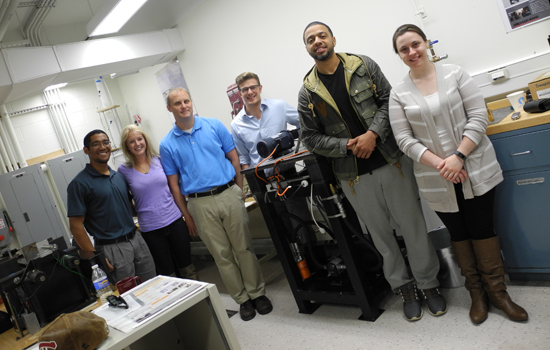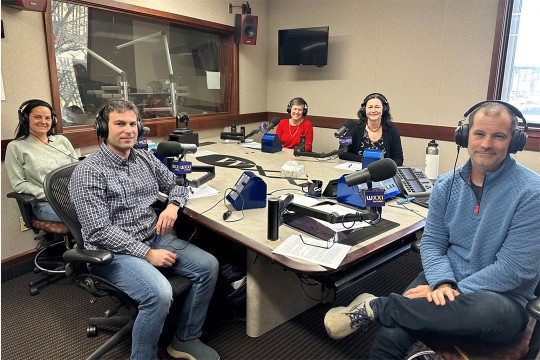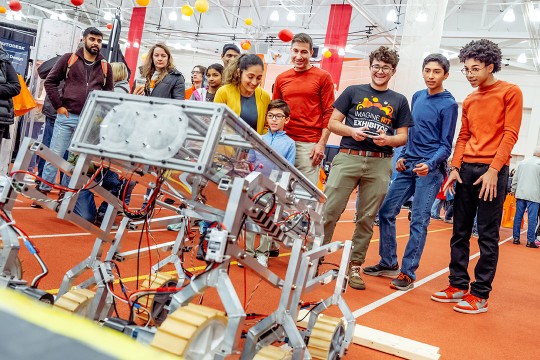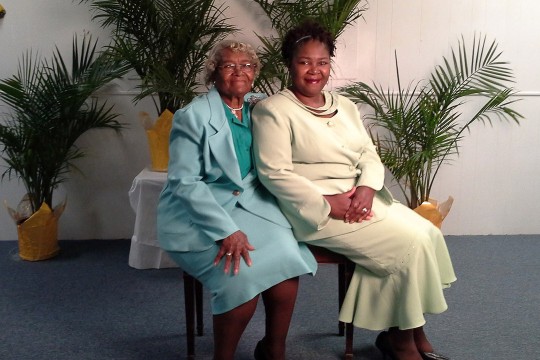RIT advances lab’s bearing test equipment
Equipment improves capabilities in machine service diagnosis and provides platform for student-faculty research projects
Engineering students, from left, Kevin Burnett, Molly Mariea, faculty member Jason Kolodziej, Michael Bush, Anthony DiPina and Christina Amendola worked on understanding machine health monitoring and data acquisition as part of their senior design project this past spring.
Early failure detection and analysis on today’s complex machine systems could mean cost savings in the long run for companies.
Rochester Institute of Technology engineering students built a dynamic journal bearing test rig to investigate machine failure detection with support and funding from Dresser-Rand Corp., a Siemens Business, and Moog Inc. Their test rig is a prototype of an industrial reciprocal compressor system used to assess the performance of journal bearings—complex, rotating shafts found in machinery. The students fabricated the rig as part of their senior design program to simulate Dresser-Rand’s ESH-1 reciprocating compressor.
Disassembling the full-scale compressor took several hours. Use of a smaller but comparable test rig was an opportunity for the students to learn about the system capabilities. It also was a chance to discover how the dynamic loading components and data acquisition sensors they incorporated as possible improvements could impact failure analysis processing time.
Previous failure analysis of the compressor journal bearing that took nearly a day to set up and change between experiments now takes one hour due to the students’ improvements.
Dresser-Rand and Moog have been long-time partners with RIT’s engineering college, said Jason Kolodziej, associate professor of mechanical engineering at RIT. His background is in machine condition monitoring, and over the past several years, he has led numerous undergraduate and graduate research projects on improvements to instrumentation, vibration suppression and data acquisition technology focused on machine-performance monitoring supported by Dresser-Rand.
“Working on industry-relevant research and design projects as part of a senior capstone design experience is the hallmark of the Multidisciplinary Senior Design course sequence,” said Kolodziej. “Giving a young engineer the opportunity to apply what they have learned in the classroom to help design an actual working product, whether it be for faculty research or a company prototype, is a win-win for everyone involved. Many of my students have been recruited by the company directly as a result of the outstanding effort they put forth on their project.”
Researchers such as Kolodziej and his students continually test conditions of bearings to assess and predict end-of-life service thresholds to better prevent unscheduled downtime of equipment. Journal bearings are specific to different types of rotating machinery such as automobile motors, gas compressors and large wind turbines, for example, and necessary to prevent friction between moving parts and control motion.
Dresser-Rand’s funding for this year’s project, estimated at $10,000, included equipment and employee training with the student-engineers throughout the year. Moog Inc. provided adjunct equipment—essential cabling, controllers, actuators and data acquisition tools—valued at $20,000. The bearing equipment is located in the Compressor Test Cell Laboratory in RIT’s Kate Gleason College of Engineering.
In 2011, Dresser-Rand donated the original advanced reciprocating compressor, a system used in the oil, gas and petrochemical industries. Since that time, the equipment has been used for educational laboratory-style experiments for several engineering courses, senior-design teams and co-op project experiences. Dresser-Rand’s support is part of its University Project Sponsorship program designed to provide universities with equipment and information to help advance knowledge of the engineering workforce and to further the company’s initiatives, from recruitment to research.
James M. Sorokes, technical coordinator of Dresser-Rand’s university relationships, has been very satisfied with the Dresser-Rand/RIT relationship: “The partnership between our two organizations has been mutually beneficial. It has allowed RIT students to participate in research and development on new and improved technologies while also allowing Dresser-Rand to identify highly qualified engineers for our work force. It is truly a win-win situation.”















